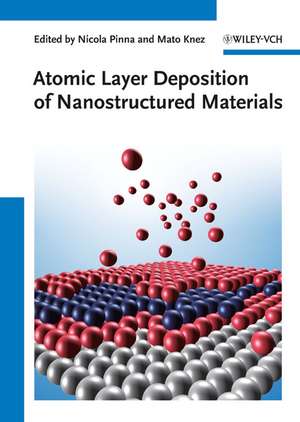Atomic Layer Deposition of Nanostructured Materials
Editat de Nicola Pinna, Mato Knezen Limba Engleză Hardback – 22 noi 2011
Preț: 843.41 lei
Preț vechi: 1039.05 lei
-19% Nou
Puncte Express: 1265
Preț estimativ în valută:
161.38€ • 168.95$ • 133.54£
161.38€ • 168.95$ • 133.54£
Carte indisponibilă temporar
Doresc să fiu notificat când acest titlu va fi disponibil:
Se trimite...
Preluare comenzi: 021 569.72.76
Specificații
ISBN-13: 9783527327973
ISBN-10: 3527327975
Pagini: 472
Ilustrații: 132 schwarz-weiße und 43 farbige Abbildungen, 7 schwarz-weiße Tabellen
Dimensiuni: 178 x 243 x 29 mm
Greutate: 1.03 kg
Editura: Wiley Vch
Locul publicării:Weinheim, Germany
ISBN-10: 3527327975
Pagini: 472
Ilustrații: 132 schwarz-weiße und 43 farbige Abbildungen, 7 schwarz-weiße Tabellen
Dimensiuni: 178 x 243 x 29 mm
Greutate: 1.03 kg
Editura: Wiley Vch
Locul publicării:Weinheim, Germany
Public țintă
Materials Scientists, Surface Chemists, Physicists, Semiconductor Industry, Semiconductor Physicists, Libraries, Chemists in IndustryNotă biografică
Nicola Pinna studied physical chemistry at the Université Pierre et Marie Curie (Paris). He received his PhD in 2001, and in 2002, he moved to the Fritz Haber Institute of the Max Planck Society (Berlin). In 2003, he joined the Max Planck Institute of Colloids and Interfaces (Potsdam). In 2005, he moved to the Martin Luther University, Halle-Wittenberg, as an Assistant Professor of Inorganic Chemistry. Since 2006 he is researcher at the Department of Chemistry and CICECO of the University
of Aveiro and since 2009 he is also Assistant Professor at the School of Chemical and Biological Engineering of the Seoul National University. In 2011 he was ranked among the top 100 materials scientists of the past decade by impact. His research activity is focused on the development of novel routes to nanostructured materials, their characterization, and the study of their physical properties.
Mato Knez studied chemistry at the University of Ulm in Germany. He did his dissertation at the Max Planck Institute of solid state research in Stuttgart from 2000-2003. In 2003 he joined the Max Planck Institute for Microstructure Physics in Halle as a Postdoc where he established the ALD-based research direction. Since 2006 he is leading a research group funded by the German Ministry of Education and Research (BMBF). In January 2012 he will join CIC nanoGUNE in San Sebastian (Spain) as an Ikerbasque Research Professor. His research activities are mainly focused on various aspects of the application of ALD, including the synthesis of optical nanolaminates, infi ltration mechanisms when ALD is applied to soft materials, and ALD-assisted nanofabrication of photonic and plasmonic structures. Aside from ALD he has strong research activites in biotemplated inorganic nanostructures for applications in nanotechnology and medicine.
of Aveiro and since 2009 he is also Assistant Professor at the School of Chemical and Biological Engineering of the Seoul National University. In 2011 he was ranked among the top 100 materials scientists of the past decade by impact. His research activity is focused on the development of novel routes to nanostructured materials, their characterization, and the study of their physical properties.
Mato Knez studied chemistry at the University of Ulm in Germany. He did his dissertation at the Max Planck Institute of solid state research in Stuttgart from 2000-2003. In 2003 he joined the Max Planck Institute for Microstructure Physics in Halle as a Postdoc where he established the ALD-based research direction. Since 2006 he is leading a research group funded by the German Ministry of Education and Research (BMBF). In January 2012 he will join CIC nanoGUNE in San Sebastian (Spain) as an Ikerbasque Research Professor. His research activities are mainly focused on various aspects of the application of ALD, including the synthesis of optical nanolaminates, infi ltration mechanisms when ALD is applied to soft materials, and ALD-assisted nanofabrication of photonic and plasmonic structures. Aside from ALD he has strong research activites in biotemplated inorganic nanostructures for applications in nanotechnology and medicine.
